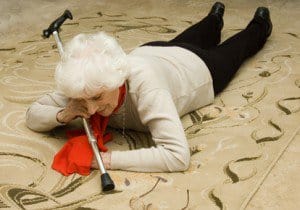
As we age, we become more susceptible to falls. Get protection so you have help when you fall.
The United States Centers for Disease Control and Prevention (CDC) have released some startling statistics regarding falls in Americans age 65 and over.
- One third of Americans age 65 and over fall each year.
- An older adult is treated in an emergency room for a fall every 14 seconds.
- An older adult dies from a fall related injury every 29 minutes.
- Among older adults, falls are the leading cause of fatal injury and the most common cause of nonfatal trauma-related hospital admissions.
Among older adults, falls are the number one cause of fractures. Typically, these fractures are of the hip, pelvis, spine, hand, arm, or ankle. Of these, hip fractures are the most serious, as they are the leading cause of loss of independence in older adults. Those with hip fractures who are not healthy and strong enough to handle the associated treatment and rehabilitation will need long term care. Knowing the consequences of falling, older adults can also develop anxiety related to fear of falling. This often leads to them avoiding healthy activities such as walking for exercise or taking part in social gatherings.
Thankfully, there are some ways in which your elderly loved ones can empower themselves and work to prevent falls and their related injuries. The first steps involve making sure their home environment is set up to reduce their risk of falling. According to the CDC, seniors should do all of the following.
- Make sure there is a clear walking path on their floor. Remove anything that they could trip over, such as loose wires, stacks of papers, books, and shoes, from stairways and other places they walk.
- If their staircases do not have lighting or handrails, install these items.
- Completely eliminate small throw rugs. If they must have them, tape them down to the floor with double-sided tape to prevent them from slipping.
- Do not place items in any cabinets they cannot easily reach while standing flat on the floor.
- Place grab bars next to their toilets and inside and around their bathtub and shower.
- Use non-slip mats on the floor of their shower.
- Make sure their home is well-lit throughout.
- Avoid walking barefoot or wearing slippers. Regular shoes with rubber soles will provide them with more traction.
Additionally, there are a variety of ways your senior loved one can work to prevent falls by taking care of their health.
- A lack of exercise can lead to weak legs with decreased stability, which increases the chances of falling. Encourage them to consider exercise programs such as Tai Chi or yoga, which increase the body’s strength and balance.
- Help your loved one review the side effects of their medications to see if dizziness or drowsiness is among them. If your loved one is experiencing these side effects, they should speak with their doctor to seek out alternatives, if possible.
- It is very important for adults age 65 and over to have an annual eye examination. If they are given prescription glasses or contact lenses, they need to wear them at all times in order to see where they are going clearly.
Be sure to look into a fall detection system if your loved one is prone to falls and may not be able to press their medical device button. Our Medical Guardian reviews will give you information on automatic fall detection systems that are currently available.


